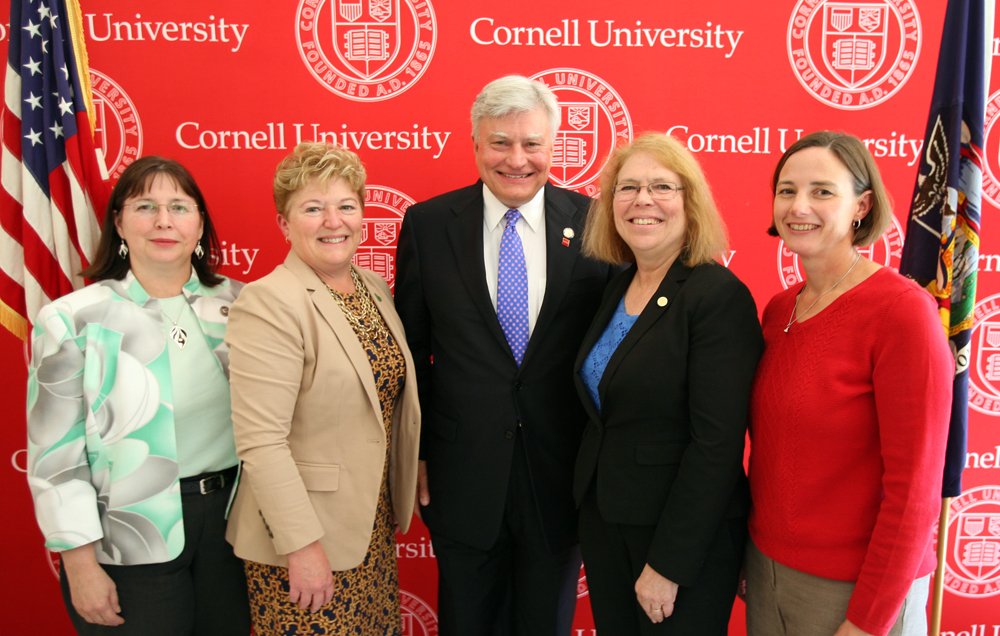$1M expands food safety capabilities at Geneva campus
By Matt Hayes

Building on its capacity as a center for food safety innovation, Cornell’s New York State Agricultural Experiment Station (NYSAES) in Geneva, New York, is poised to expand its food development and technology commercialization capabilities with $1 million in new state funding.
Announced Sept. 16 by state Sen. Michael Nozzolio, R-54th Dist., and leaders in the College of Agriculture and Life Sciences, the funding will be used to advance NYSAES’ next-generation equipment and cement its leadership position in food product development, food safety verification and training. Additionally, funds will enhance communications between the Geneva and Ithaca campuses to improve collaboration among researchers and students, growers and food processors.
Called the NextGen Food Technology Initiative, the program brings novel technologies, such as nonthermal processing equipment, to preserve and extend the shelf life of active, natural ingredients in food. Cornell will also stake out a leadership position in the development of new technologies for food safety validation tests required of food processors as they comply with stricter food safety mandates from the Food Safety and Modernization Act.
The new initiative will be housed in the Food Venture Center, part of the Institute for Food Safety that launched in December 2015 to connect food safety training and applied research to protect against the rise of foodborne illness.
“The New York State Agricultural Experiment Station is a comprehensive resource for a wide range of basic and applied research that serves our farmers and food industry, from breeding new plants for the field to keeping foods safe to the plate,” said Kathryn Boor, the Ronald P. Lynch Dean of the College of Agriculture and Life Sciences. “With the support of Senator Nozzolio, New York state and our private industry partners, we are turning this campus into a hub for food-system innovation.”
To meet consumer demand for natural products that have food labels listing familiar ingredients, technologies like the electrospinning unit allow encapsulation of natural ingredients to promote stability and increase shelf life. Electrospinning uses an electrically charged jet of a polymer solution that produces fibers and particles at micron- and nano-scale level for enhanced stability and design of novel food packaging materials.
“This approach expedites our movement toward foods with clean labels and enables the design of healthier and more stable foods by replacing artificial ingredients with natural ingredients, as well as the design of smart packaging materials,” said Olga Padilla-Zakour, professor and chair of the Department of Food Science.
The funding will give Cornell an edge in product development of foods that retain more nutrients than those processed with traditional heat-pasteurization. Included in the grant is the purchase of pulse electric field technology. Instead of using heat, the nonthermal process uses low levels of energy at fast rates to extract juices from fruits, vegetables and foods that previously had to be discarded. The equipment can extract valuable components from waste material, such as apple or grape pomace, to create juices that retain fresh flavor and nutrients.
A modern communications infrastructure will improve collaborations among researchers in Geneva and Ithaca. Improved webcast connections for meetings and seminars give graduate students and postdoctoral researchers added capabilities to collaborate across campus.
“From researchers developing plants for natural dyes to scientists working with this new equipment to stabilize those colors, the station will be integral in helping New York growers and entrepreneurs meet consumers’ desire for simpler labels with familiar ingredients,” said Susan Brown, the Goichman Family Director of NYSAES.
Since its inception, the Food Venture Center has helped commercialize more than 13,000 food products. The center serves more than 3,000 companies each year, including many startups.
“We are fortunate here in the Finger Lakes to be home to one of the world’s top agricultural research centers. Funding the NextGen Food Tech Initiative, along with the other investments that have been made at the station, will help provide farmers and food processors, as well Cornell scientists, with new opportunities to expand and grow New York’s farm and food community,” said Nozzolio.
Matt Hayes is managing editor and social media officer for the College of Agriculture and Life Sciences.
Media Contact
Get Cornell news delivered right to your inbox.
Subscribe